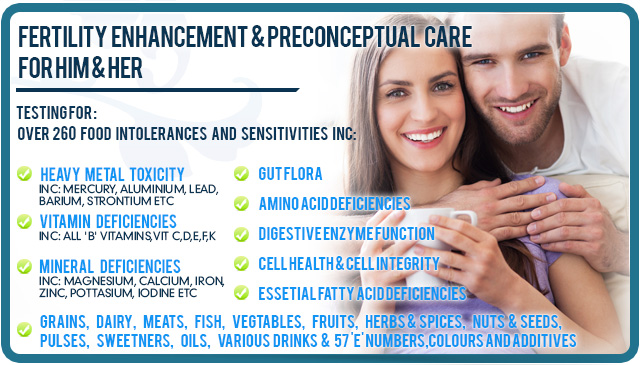
Fertility & Preconceptual Care
At ALLERGY TESTING UK we have seen a tenfold increase in the number of clients contacting us and asking us to run the Pre conceptual Care Program.
It is estimated that 1 in 4 couples will experience some fertility problems, and many of these couples will wait over 3 years before conception. Of all the reasons for conception failures , less than 50% are due to structural problems. The remaining number are equally spread between male problems of semen quality and 'unexplained' reasons.
Female fertility is extremely amenable to nutritional/lifestyle intervention, increasing the chances of natural conception very significantly. Even if structural problems necessitates IVF treatment, the chances of success have been shown to be 50% in couples following a holistic approach, as opposed to 20% in normal couples. Male semen quality can likewise be improved, increasing sperm count and quality tenfold in some cases.

There is a great amount of offer from both medical and natural fertility experts and each have their own strengths. Advances in medical technology mean that fertility testing can give great insights into the possible causes, and fertility treatment has come on a lot since the first 'test tube babies' with new developments all the time.
On the other hand the natural approach supports you by helping you to understand more about your fertility and cycles. Natural fertility looks at working with your body for optimum fertility with nutrition, therapies and lifestyle advice. This approach can also improve the outcome of fertility treatment such as IVF.

Pesticides and Male Fertility
A recent study suggests that pesticides on fruit and vegetables could be doing untold damage to male fertility. Thirty out of thirty-seven crop chemicals tested were found to interfere with the action of testosterone, critical to reproduction and male health. Experts worry that a lack of testosterone could lead to feminising unborn boys, raising their risk of reproductive defects at birth, and to low sperm counts and testicular cancer later in life.
The study for the European Commission was carried out by University of London School of Pharmacy. Professor Andreas Kortenkamp said in a Daily Mail report that, although manufacturers follow the law, the law does not require pesticides to be tested for their effects on hormones. Chem Trust added that as pregnant women and boys are told to eat lots of fruit and vegetables it is vital that the testing of pesticides includes their effects as hormone disrupters, which it seems is currently not always part of the testing process.

Wifi and Reproduction
Anyway, it seems that researchers in Argentina have found that a man having the equivalent WiFi dose of a laptop on his legs for 4 hours doesn't get dead sperm, but that the DNA of many of them become damaged. This is significant because infertility experts reckon that damaged DNA is the biggie when it comes to not being able to father a child. The numbers are there, but they just aren't healthy.

Female Hormones and Pesticides
New Research indicates that Female hormones have been damaged by common pesticides and insecticides found in your normal fruit and vegetables: read the research here.
Some of the major causes of Infertility:
Age: Both men and women are their most fertile in their early 20s. Female fertility declines sharply after the age of 35. Around one in three of couples in which the woman is over 35 have fertility problems. This rises to twothirds when the woman is over 40. Male fertility gradually declines from the age of 40.
Hormonal Disorders: An under active thyroid or a malfunctioning pituitary gland can cause fertility issues.
Smoking: Studies have shown that women who smoke take longer to conceive. Research has found that the toxic chemicals in cigarettes can damage the lining of the fallopian tubes, which help transport the egg from the ovary to the womb. Partners of men who smoke also have a reduced chance of conceiving as smoking can decrease the amount of sperm produced and their motility.
Drinking: Alcohol can reduce fertility in both men and women. It is not yet understood exactly how alcohol affects fertility but studies have shown drinking alcohol reduces the chances of a woman conceiving. In men, heavy drinking may affect sperm quality which can impact on chances of a successful pregnancy.
Bad Timing: An egg is fertilised when a man's sperm meets the woman's egg at about the time of ovulation, which is when the egg is released from the ovaries. Women mostly ovulate once during each cycle, and the most likely time for conception is 14 days before a period.
Stress: Worry and tension can cause hormonal changes in the body, which can lead to fertility problems.
Sexually Transmitted Infections: Chlamydia can cause pelvic inflammatory disease (PID) as well as fallopian tube infection in women. Both may cause permanent damage to the fallopian tubes and uterus, leading to infertility. Gonorrhoea can also cause PID and reduce fertility in men as well.

Chemicals, Pesticides, Insecticides and Artificial Sweeteners
All chemicals including prescribed medications have shown to have an effect on Male and Female Reproduction, by either damaging the hormone or changing its structure. Artificial Sweeteners like Aspartame, Canderel and Sweetex have thousands of side effects and disrupt the body's functioning.
Environmental Toxins and Heavy Metals
A growing body of evidence suggests that preconception and prenatal exposure to certain environmental toxins can impact foetal development adversely and lead to potentially longlasting health effects.
Mercury
Risk Factors: Exposure can come from eating fish, contact with quicksilver and use of skinlightening creams. Exposure during pregnancy can lead to adverse neurodevelopmental outcomes that include lower IQ, poor language and motor development.
Reducing Exposure: Pregnant, preconception and breastfeeding women should follow U.K Environmental Protection Agency and state specific fish consumption guidelines. Avoid shark, swordfish, king mackerel, tile fish and large tuna.
Lead
Risk Factors: Risk factors for exposure from cosmetics, Lipstick is contains Lead. Lead is nontoxic to a developing foetus.
Reducing Exposure: Never eat nonfood items (clay, soil, pottery or paint chips); avoid jobs or hobbies that may involve lead exposure; stay away from repair, repainting, renovation and remodelling work conducted in homes built before 1978; eat a balanced diet with adequate intakes of iron and calcium; avoid cosmetics, food additives and medicines imported from overseas; and remove shoes at the door to prevent tracking in lead and other pollutants.
Endocrinedisrupting chemicals
Risk Factors: Human prenatal phthalate exposure ( Plastic Bottles) is associated with changes in male reproductive anatomy and behavioural changes primarily in young girls. Animal studies suggest prenatal exposure to BPA is associated with obesity, reproductive abnormalities and neurodevelopmental abnormalities in offspring. Endocrinedisrupting chemicals mimic or antagonize the effects of hormones in the endocrine system and can cause adverse health effects that can be passed on to future generations.
Reducing Exposure: Decrease consumption of processed foods; reduce consumption of canned foods; avoid use of plastics with recycled codes, be careful when removing old carpet because padding may contain chemicals; and use a vacuum machine fitted with a HEPA filter to get rid of dust that may contain chemicals.
We Suggest when purchasing our Fertility and Pre conceptual Test that both you and your partner are tested, to ensure that you are both covered for all the items listed and thus eliminate any potential discrepancies.
to buy click here.
